Running an efficient business is a bit like leading an orchestra: it's all about coordinating vital processes, projects, tasks and resources to perfection. For this, a high-performance work management system is essential. It's the orchestra conductor that ensures the synchronization of all the key elements of your structure, promoting fluid communication, impeccable organization and maximum efficiency.
In this guide, we'll explore the world of work management together. You'll discover its many benefits, understand how it differs from traditional project management, and learn how to fully exploit the capabilities of Monday.com work management software to boost your company's operations.
What is work management?
Managing a company is a bit like piloting a ship: it requires dexterity and precision. At the heart of this discipline, the planning, organization, execution and monitoring of activities are crucial to the effective achievement of set objectives. Work management is the art of directing these activities, acting as an orchestra conductor for tasks, resources, deadlines and deliverables. It involves clearly defining the strategies to be adopted to master these essential elements.
This fundamental process enables any organization to sail confidently towards success, guaranteeing seamless coordination and optimum performance.
The work management process
The beauty of workflow management lies in its incredible adaptability. It can be fully customized to perfectly match your specific workflows and business objectives. Typically, you'll follow a process structured around three essential steps:
Step 1: Define objectives and OKRs (Objectives and Key Results)
Start by defining clear objectives based on your company's priorities or anticipated needs. This gives a clear direction to all activities and aligns every team member with the same ambitions.
Step 2: Define projects and business processes
360° visibility of your global workflow is crucial. This ensures that all workflows are optimized for efficiency and productivity, allowing each project to progress unhindered.
Step 3: Plan resources and create tasks
This final step involves allocating the necessary resources and creating specific tasks. Assign them to the appropriate teams, sub-groups or individuals, making sure that everyone knows exactly what their responsibilities are.
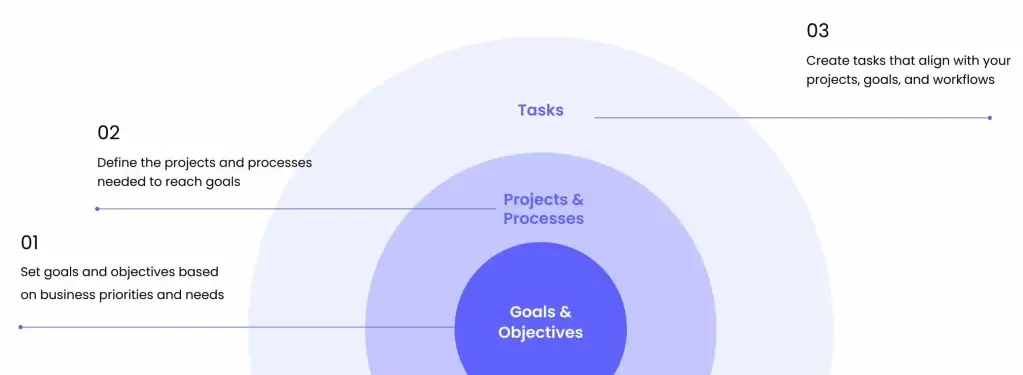
Work management vs. project management
Work management and project management are two concepts that we often hear used interchangeably, but it's important to understand the significant differences between them.
Project management is specifically focused on precise initiatives with clearly defined beginnings and ends, or specific objectives, such as launching a new website or bringing a product to market. It focuses on the deadlines, budgets and resources required to bring a given project to fruition.
On the other hand, work management encompasses project management, but extends far beyond it. It is broader in scope, and adapts more fluidly to the ongoing needs of a company. For example, work management can be applied to optimize processes that are not limited to specific projects, such as planning induction sequences for new employees, automating workflows in customer service, or improving communication and interaction with suppliers.
So, although project management is a component of work management, the latter represents a more holistic and flexible approach adapted to the varied dynamics and requirements of a modern enterprise.
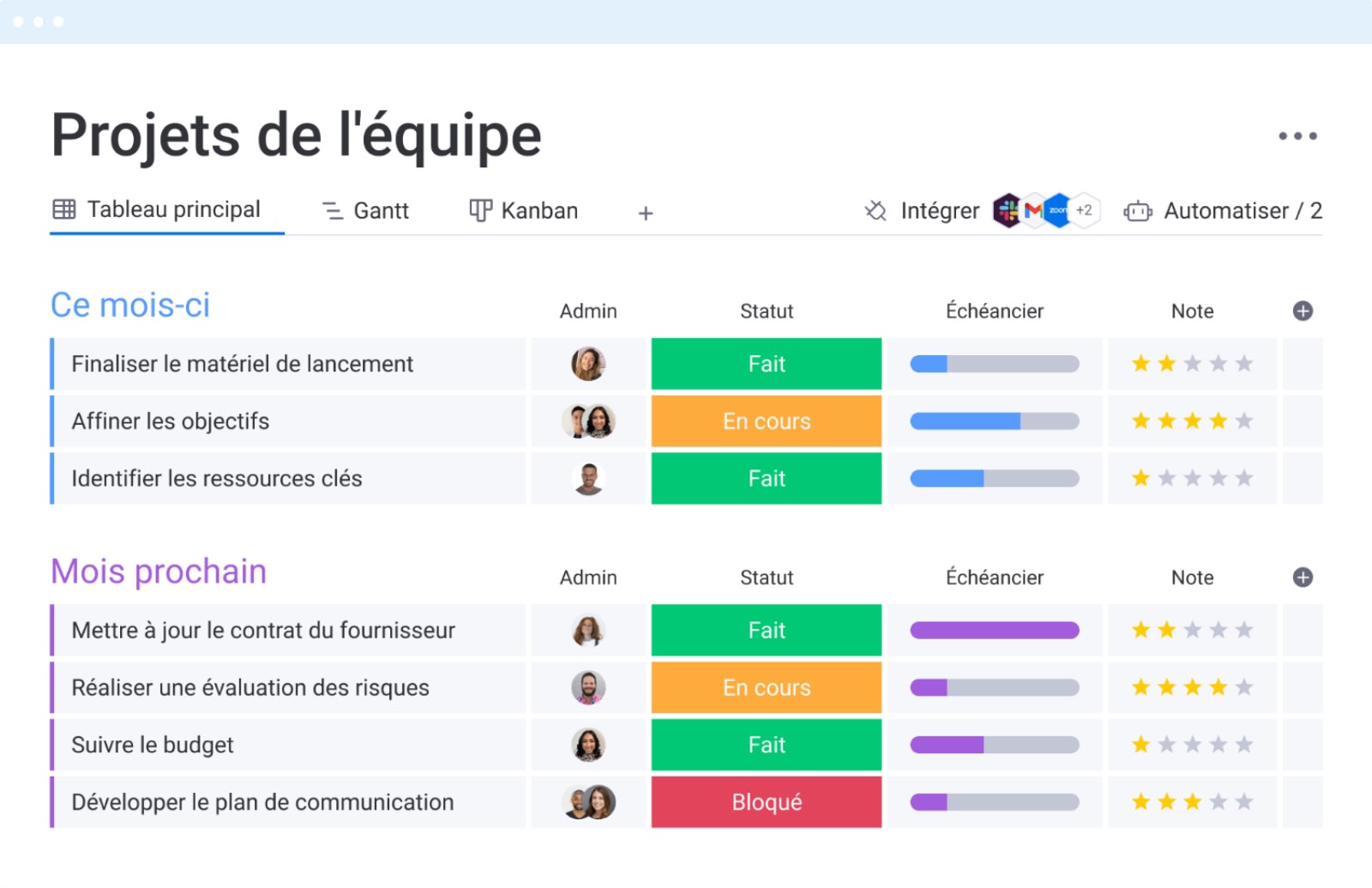
What is work management software?
Work management software centralizes and simplifies the management of key processes within a team, unifying goal setting and project progress monitoring in a single space. User-friendly platforms like Monday work management revolutionize this approach by offering no-code tools. These tools enable teams to create customized workflows adapted to any organizational process, without requiring in-depth technical skills.
Whether you're managing day-to-day tasks or overseeing large-scale projects, these work management platforms provide you with all the tools you need to optimize your efficiency. They enable you to work smarter, by centralizing information and facilitating access to all the resources you need to bring your initiatives to fruition.
What challenges can work management meet?
Effective work management is crucial to helping teams navigate through the challenges common within their business. Here are some key areas where it comes into play:
Resource management
Professional resources, including personnel, skills, tools, budgets and other physical assets, are essential to the success of your projects. Work management helps you to plan these necessary resources precisely, avoiding waste or over-utilization. This rigorous control ensures that every resource is optimized, contributing to the company's overall performance.
User responsibility
Consider a sales team waiting for a crucial update from the product team to move forward with a major sales proposal. Without knowing who needs to provide this information or when it will be available, the sales team may be forced to postpone its presentation, or conduct it without the details essential to close a sale. Work management systems clarify individual responsibilities, ensuring that each team member knows exactly what tasks he or she has to perform, and who is responsible for each part of the project.
Budget cuts
With labor and raw material costs on the rise due to inflation, layoffs and supply chain disruptions, companies need to be all the more vigilant. Labor management rigorously monitors budgets and forecasts profits and losses, optimizing every euro invested. For example, with salary budgets set to rise, as reported by Willis Towers Watson with an increase of 4.1 % for 2023, prudent management becomes essential.
Teams in silos
Isolating departments can lead to knowledge silos, blocking access to vital information. An Aberdeen study reveals that a call center with 200 agents could lose up to $1.5 million annually in labor costs due to these silos. Work management promotes better communication and alignment between departments, helping to break down these barriers and increase organizational efficiency.
The main benefits of work management
Adopting effective work management systems has many significant benefits for your company:
Improved collaboration
A high-performance work management system is synonymous with transparency. It eliminates the risk of anyone feeling out of touch with project objectives or task lists. With the right management platform, everyone involved has access to the data they need to accomplish their tasks and make the best decisions for the company. This clarity improves collaboration between team members and different departments, resulting in smoother, more efficient work processes, and consequently, high-quality results for your company and your customers. Improved communication also means fewer misunderstandings, a crucial aspect of success. As New York Times bestselling author Greg McKeown puts it, "When misunderstandings are plentiful, productivity is low and costs are high!"
Reduce bottlenecks and delays
Careful planning makes your business more agile. When teams are well informed of their needs and communicate effectively, they take responsibility for their work, making it easier to detect and resolve potential bottlenecks in advance. This proactive management minimizes delays and optimizes operational efficiency.
Delivering better results for customers
The right work management software provides clear visibility of the progress of tasks, projects and processes. This helps you identify areas requiring additional support or resources, enabling you to adjust your workflows before productivity or customer service quality are affected. This responsiveness ensures that you can continually deliver outstanding results to your customers, reinforcing their satisfaction and loyalty.
Which teams can benefit from a work management solution?
Implementing a work management solution can truly transform your organization, especially if you need to plan or collaborate within your team, or between different departments. Let's take a look at how different types of teams benefit from work management tools:
- Marketing Marketing teams use these tools to plan campaigns, monitor budgets and manage resources. This organization enables smooth execution of marketing initiatives and efficient allocation of budgets.
- Project Management Office (PMO) : For a PMO, work management solutions are essential for linking overall corporate strategy to project execution. They also facilitate portfolio management across the organization, ensuring a clear vision and precise tracking of the various projects in progress.
- Information Technology (IT) In the IT sector, these tools automate and track technical tasks and service requests. This enables rapid response to IT problems and efficient management of technical resources.
- Human Resources (HR) HR: HR teams benefit greatly from workflow management to track processes such as onboarding, recruitment and training. These systems help to organize and streamline HR activities, improving the employee experience and optimizing operations.
- Finance Finance teams use these tools to monitor operational costs and budgets. This ensures accurate financial management and proactive budget planning, essential for the company's financial health.
Each team, according to its specific functions and unique needs, finds in work management tools an indispensable support to improve its processes and coordination. This translates into improved overall performance for the company as a whole, making work management a central pillar of organizational efficiency.
Which processes are part of Monday work management?
Workflow management can seem abstract until you see it in action. It's about managing critical processes from a centralized location, using a powerful platform like monday.com. Here's how companies, managers and executives can streamline various processes to achieve common goals faster and on a larger scale:
- Project management : Plan and collaborate on any project or portfolio in real time.
- Task management and task lists : Assign tasks, set deadlines and monitor progress or completion.
- Customer projects : Keep your customer projects on track by balancing the team's capacity to meet your objectives.
- Sales operations : Simplify workflows such as supply chain management or operational budgeting.
- Resource management : Maximize the efficiency of any type of resource with easy planning, scheduling and allocation.
- Project portfolio management : Get high-level visibility on current projects.
- Objectives and strategy : Identify objectives at team or company level, define OKRs and draw up a plan to achieve them.
- Applications and approvals : Use integrated forms to grant requests and approvals to keep your projects moving.
With these tools at your disposal, take your work management to the next level and see your projects turn into successes.
Increase visibility of your company's key processes with these work management features Monday
Monday work management makes it easy to concentrate on the processes that are essential to your business. Thanks to a highly customizable design, you have everything you need at your fingertips using the following features:
- Views monday offers over 15 different views, such as our Gantt charts and Kanban boards, to give you full control over your workflow's scope, milestones, dependencies and more. What's more, our Workload View lets you balance team resources and react quickly to changing priorities.
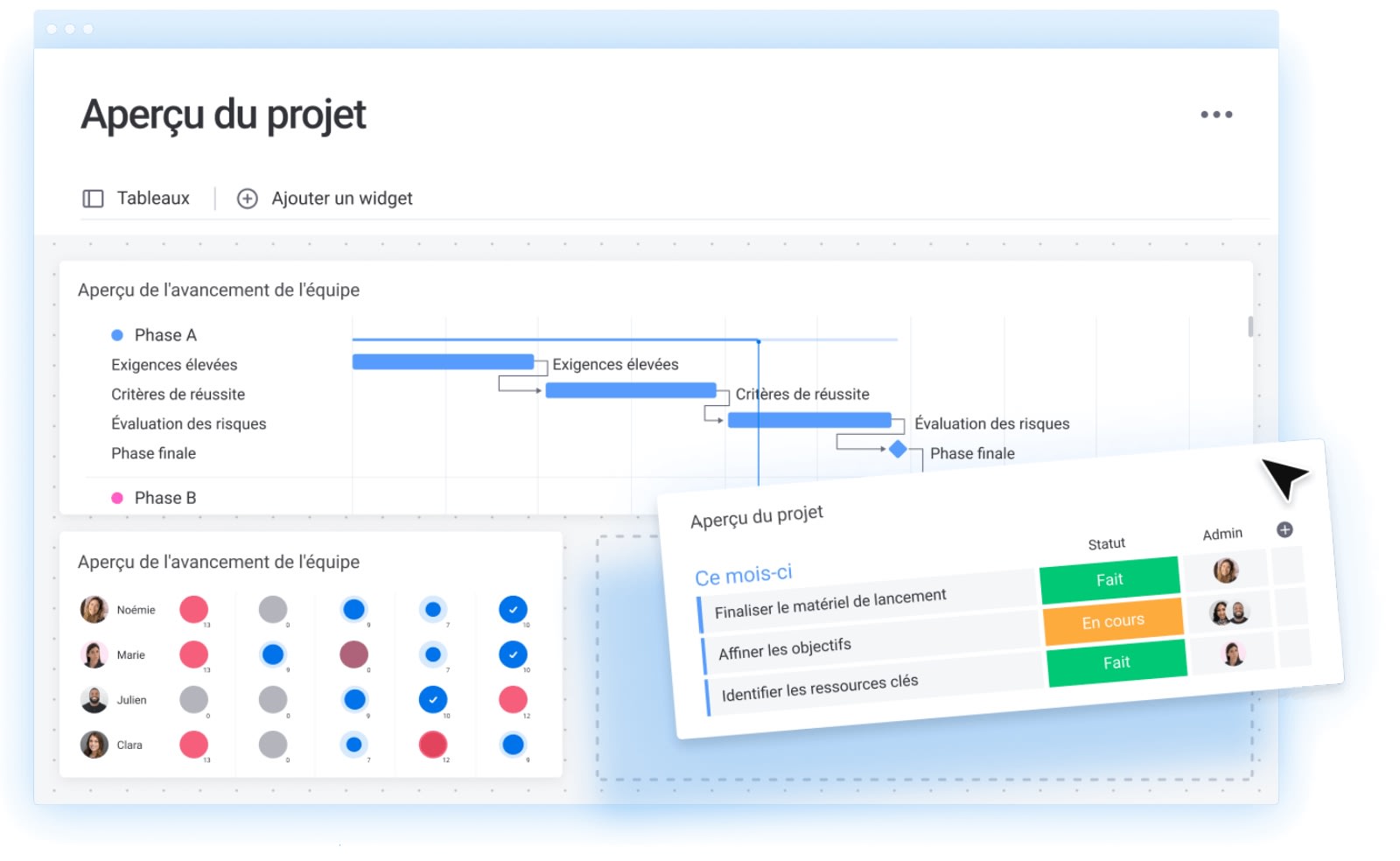
- Time tracking Record the duration of projects or processes, so you can plan similar jobs in the future.
- Dashboards Get real-time insights by creating customized dashboards to guide your decisions. Choose from over 30 widgets to display specific information on team workloads, schedules, performance analysis, budgets and more.
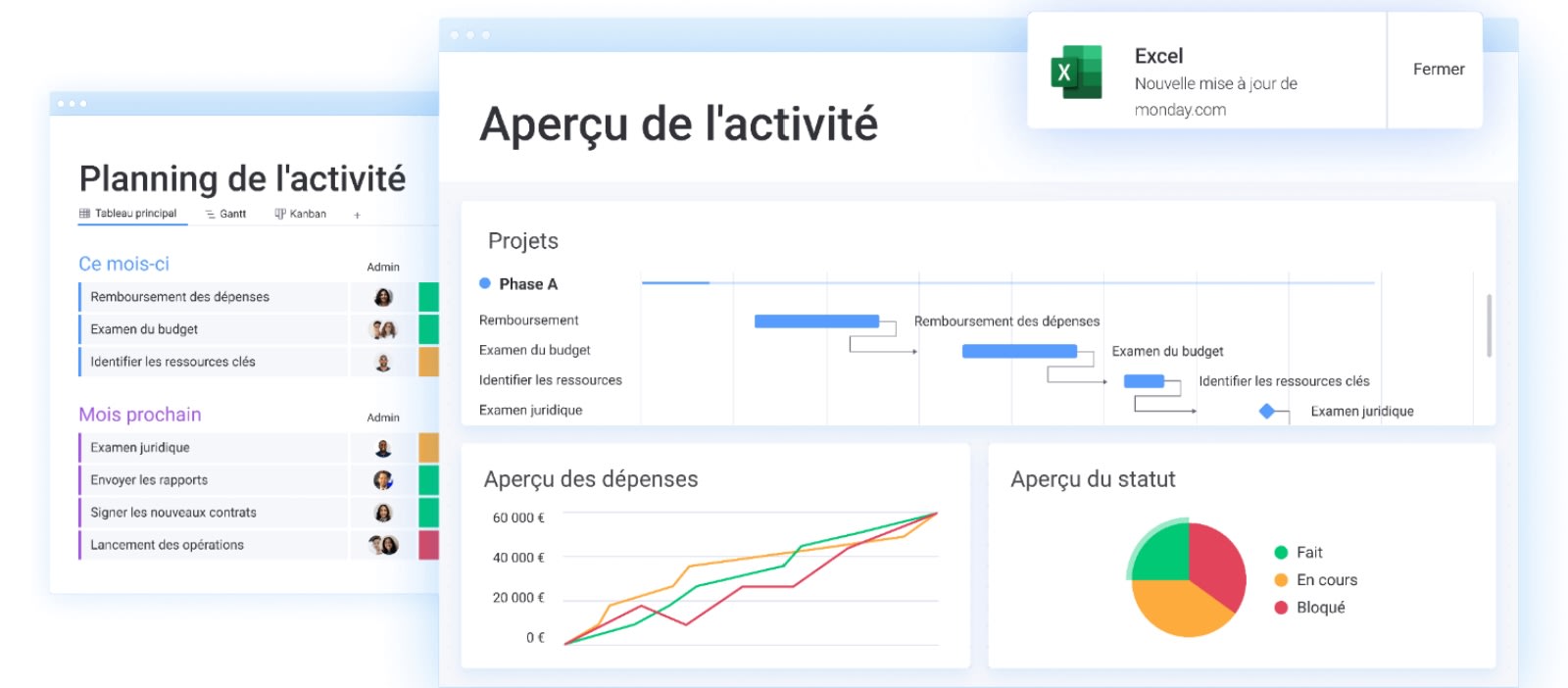
- Intuitive forms Collect essential details of requests and approvals, enabling you to communicate effectively with stakeholders, third-party suppliers or any other key collaborator who keeps your workflows moving.
- Customized workflows monday: Create the exact workflow you need to meet your business requirements. monday uses no-code building blocks to suit any team.
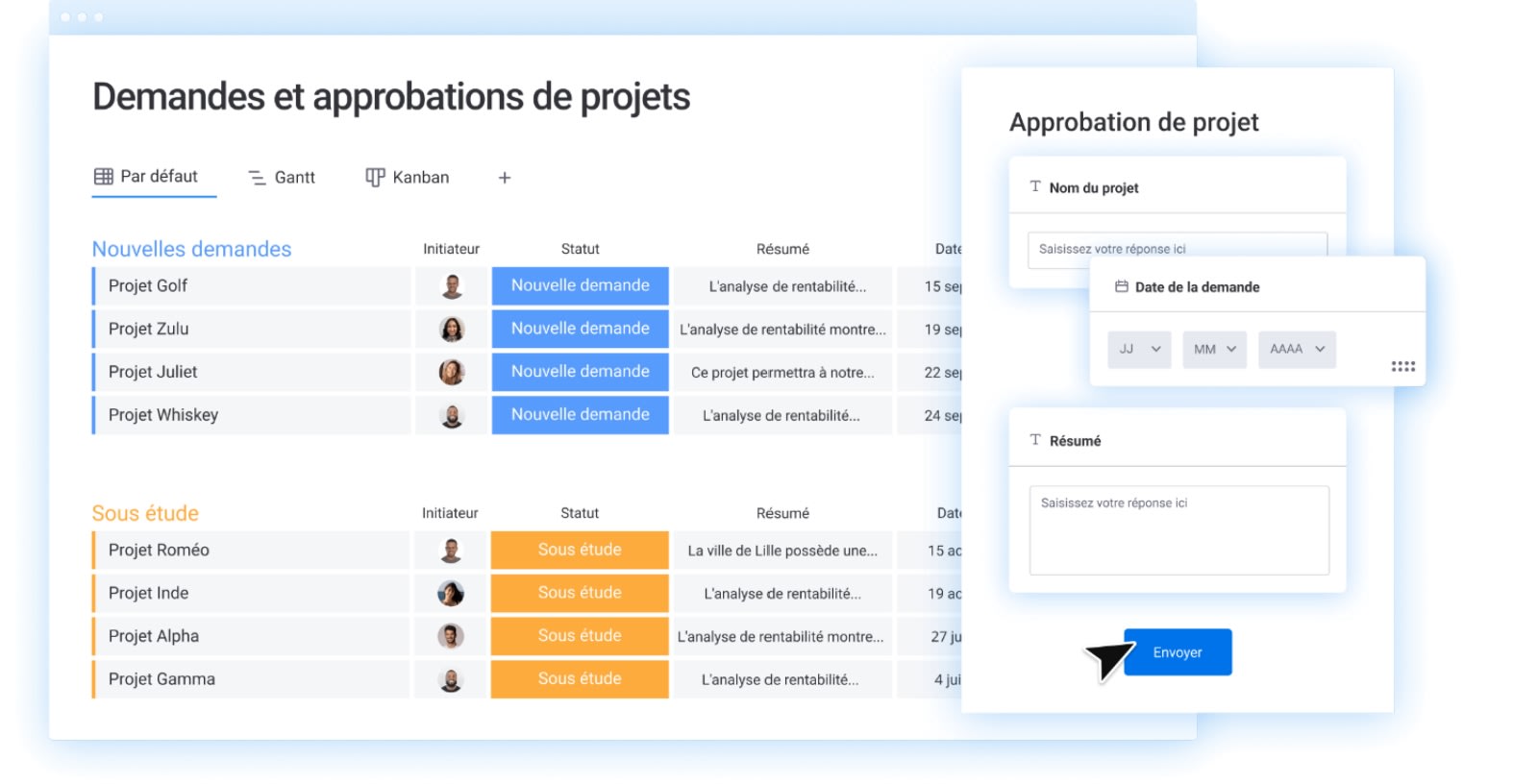
- Automation Eliminate repetitive tasks by designing automated workflows based on conditional logic. Choose from over 200 predefined automation recipes to improve efficiency across your enterprise.
- Integrations : Connect your most important third-party tools, such as Zoom, Slack, Google Drive and more. Configure any integration in just a few clicks, with no coding knowledge required.
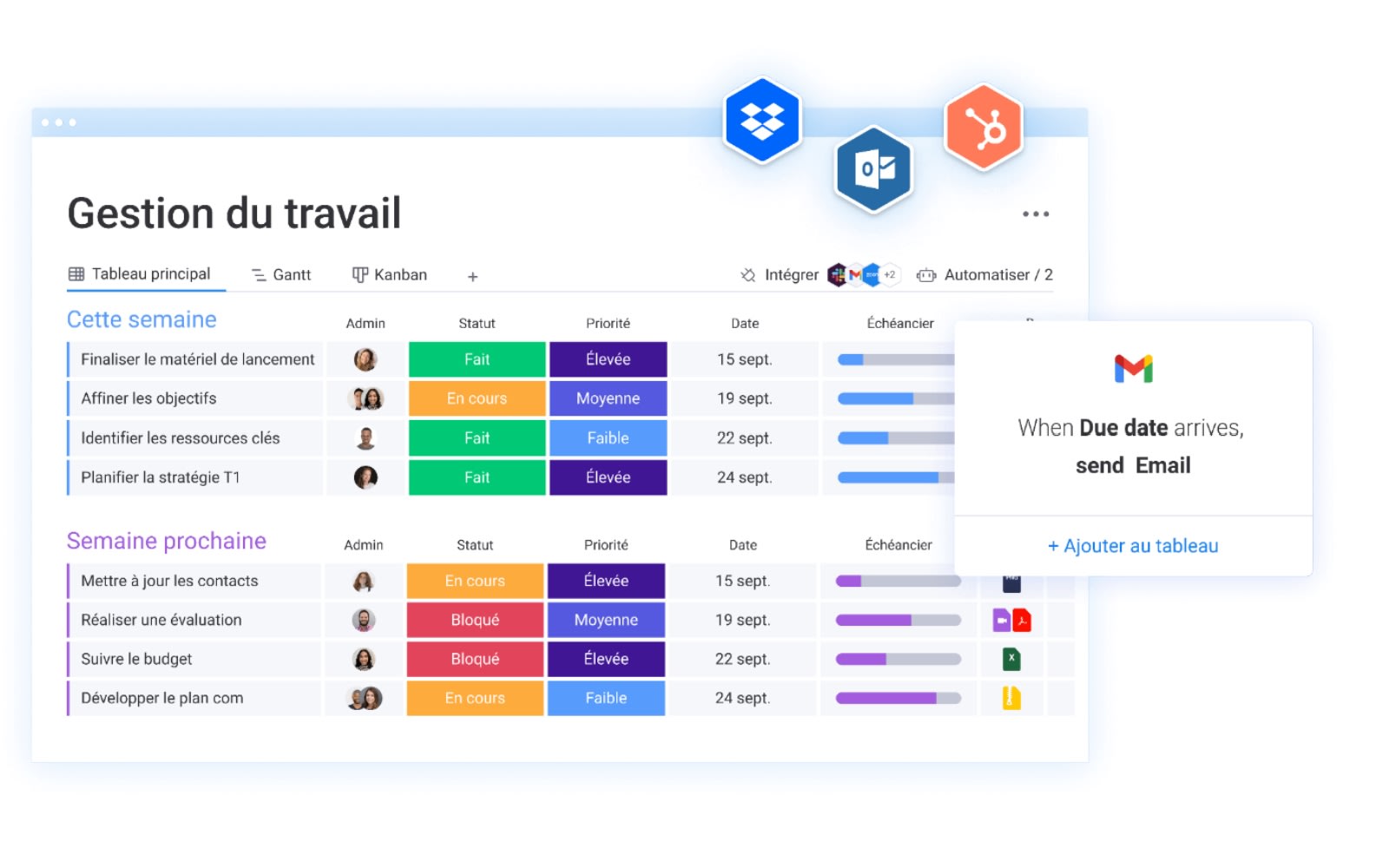
Plan and execute your business strategies with Monday work management
Effective work management is the driving force behind collaboration in any company. It encourages teams to come together, maximizing resources, perfecting project planning and establishing operational processes that run almost on autopilot.
Monday work management is a robust solution packed with outstanding features that make it easy to manage and track your business objectives. With its intuitive tools, you can simplify processes, foster better collaboration and increase transparency across all departments. Find out more about our dedicated website and start transforming your day-to-day operations into lasting successes today.



